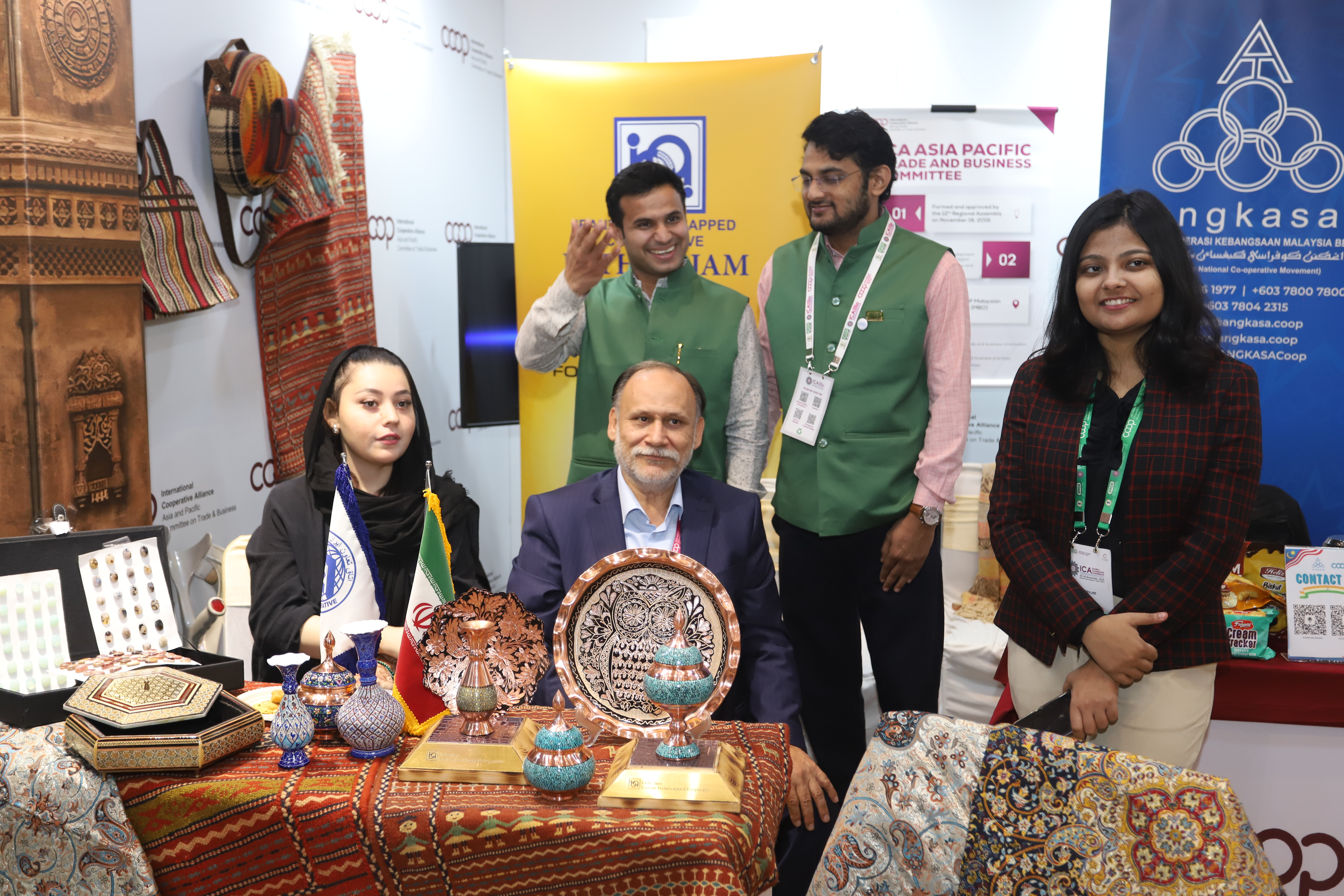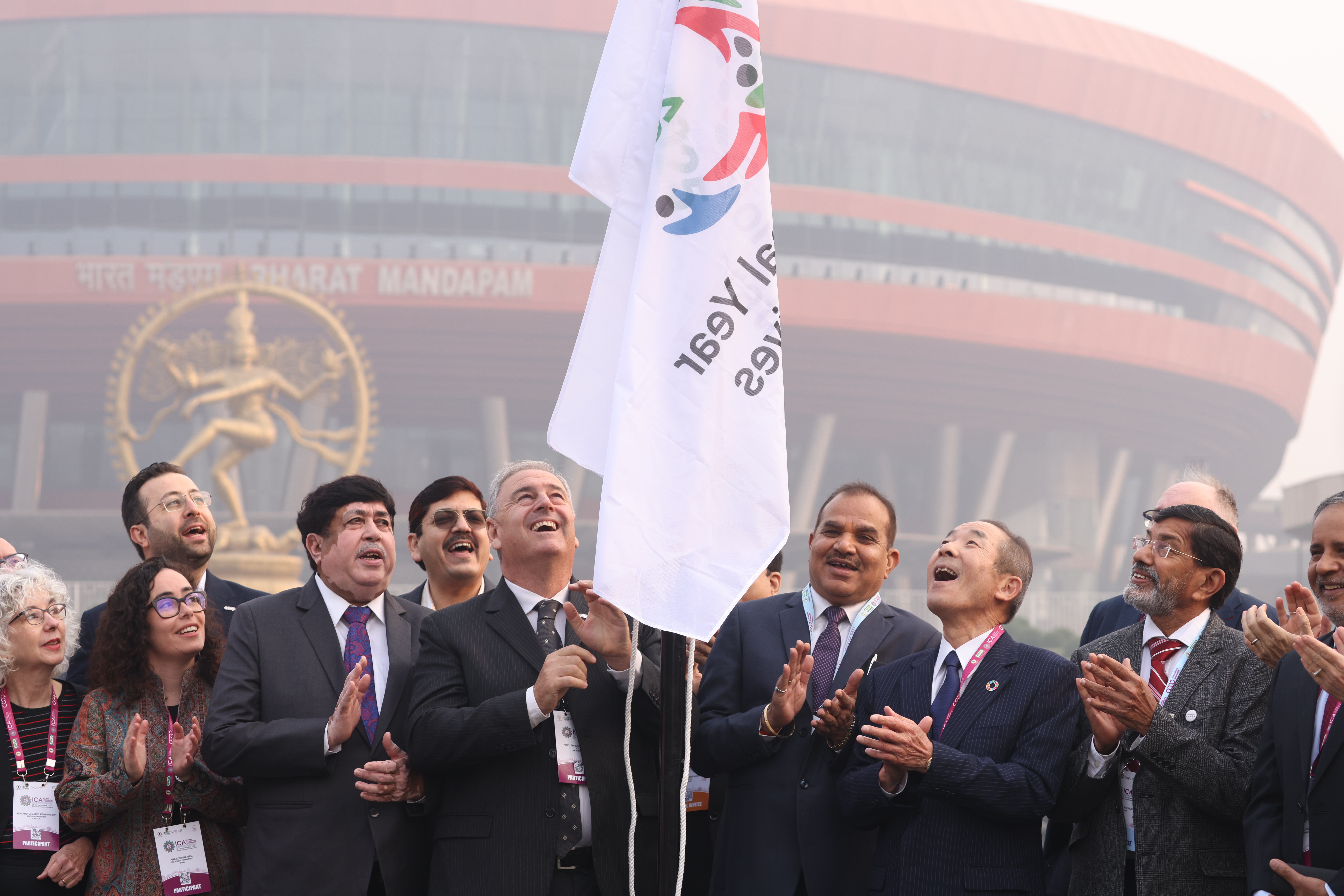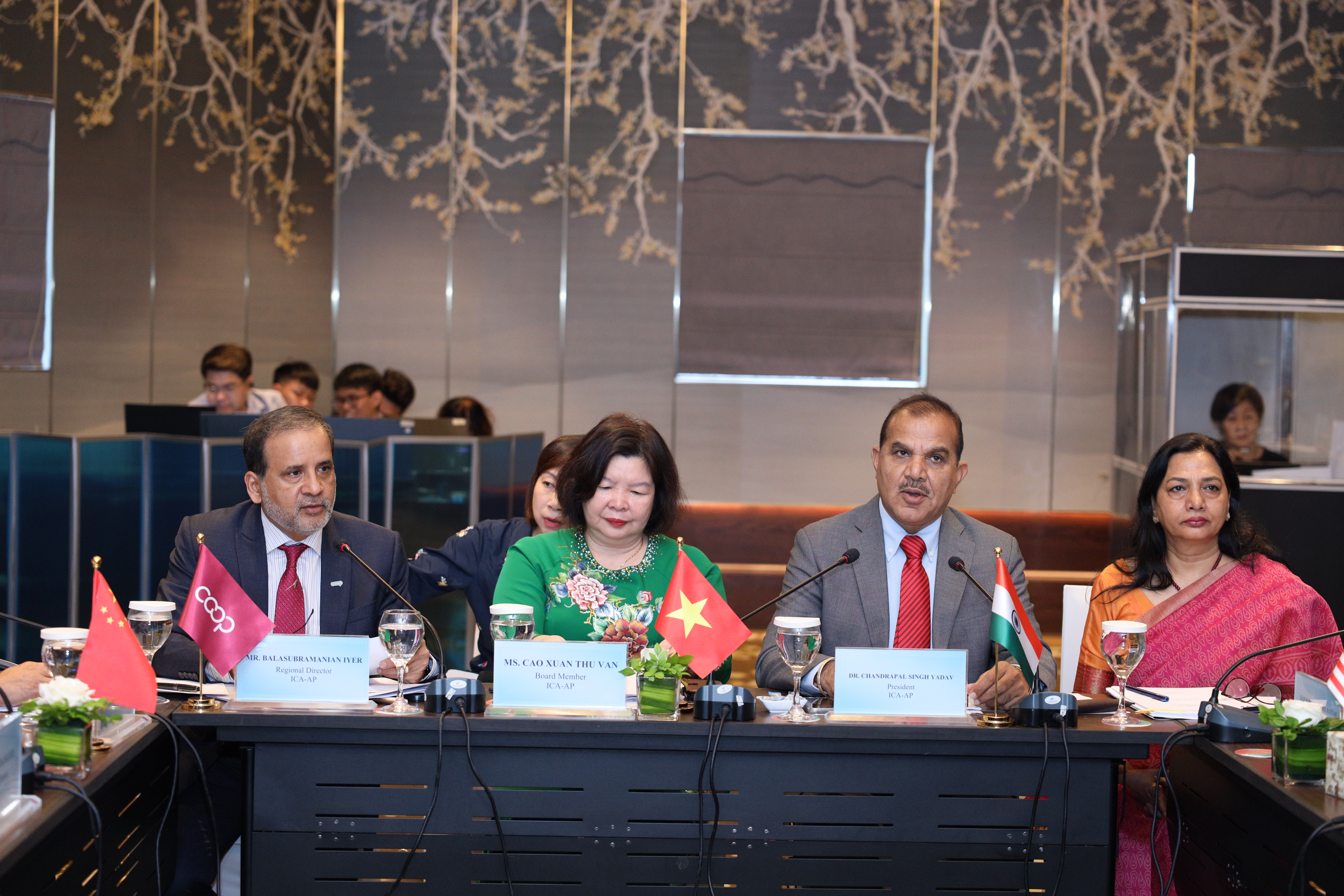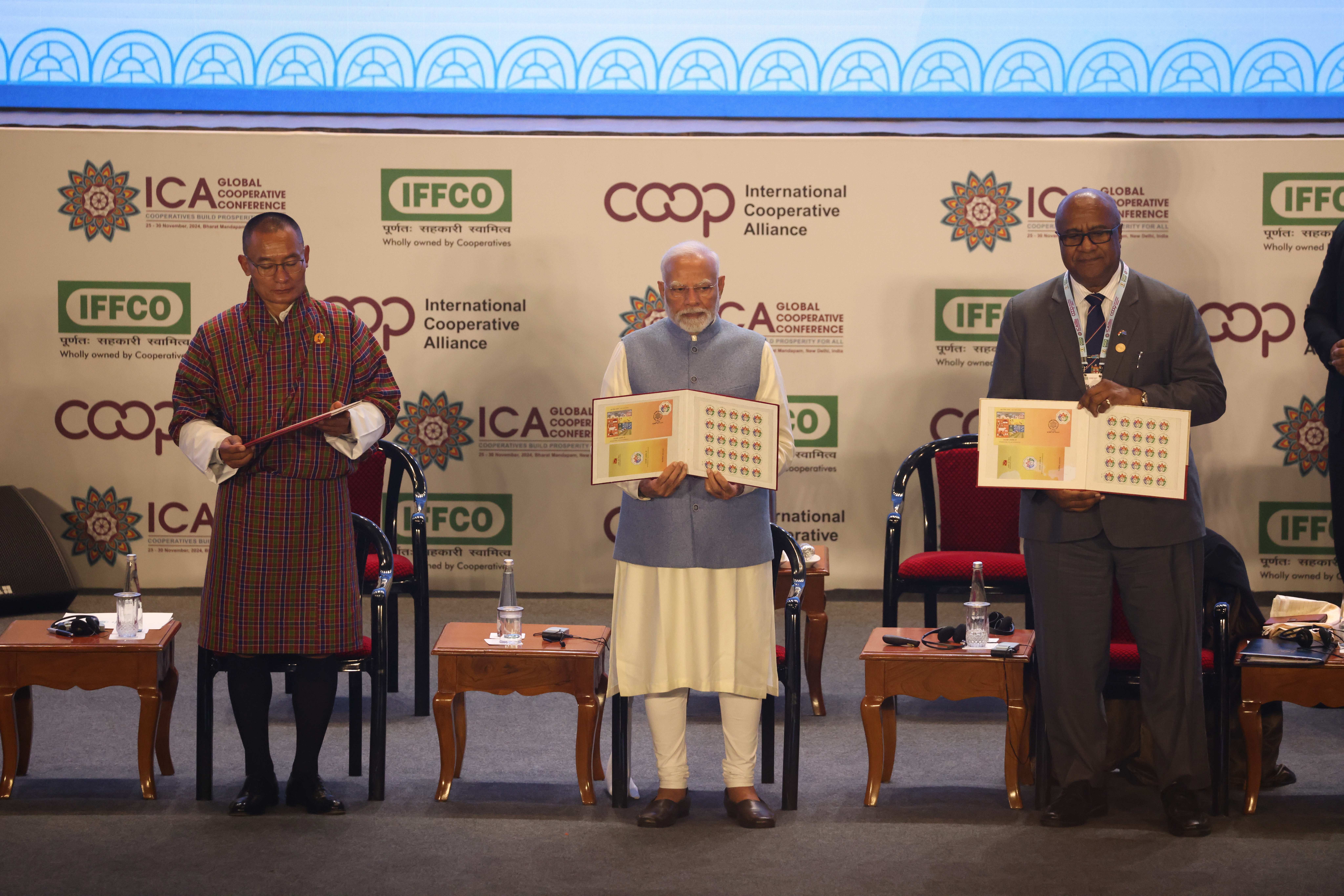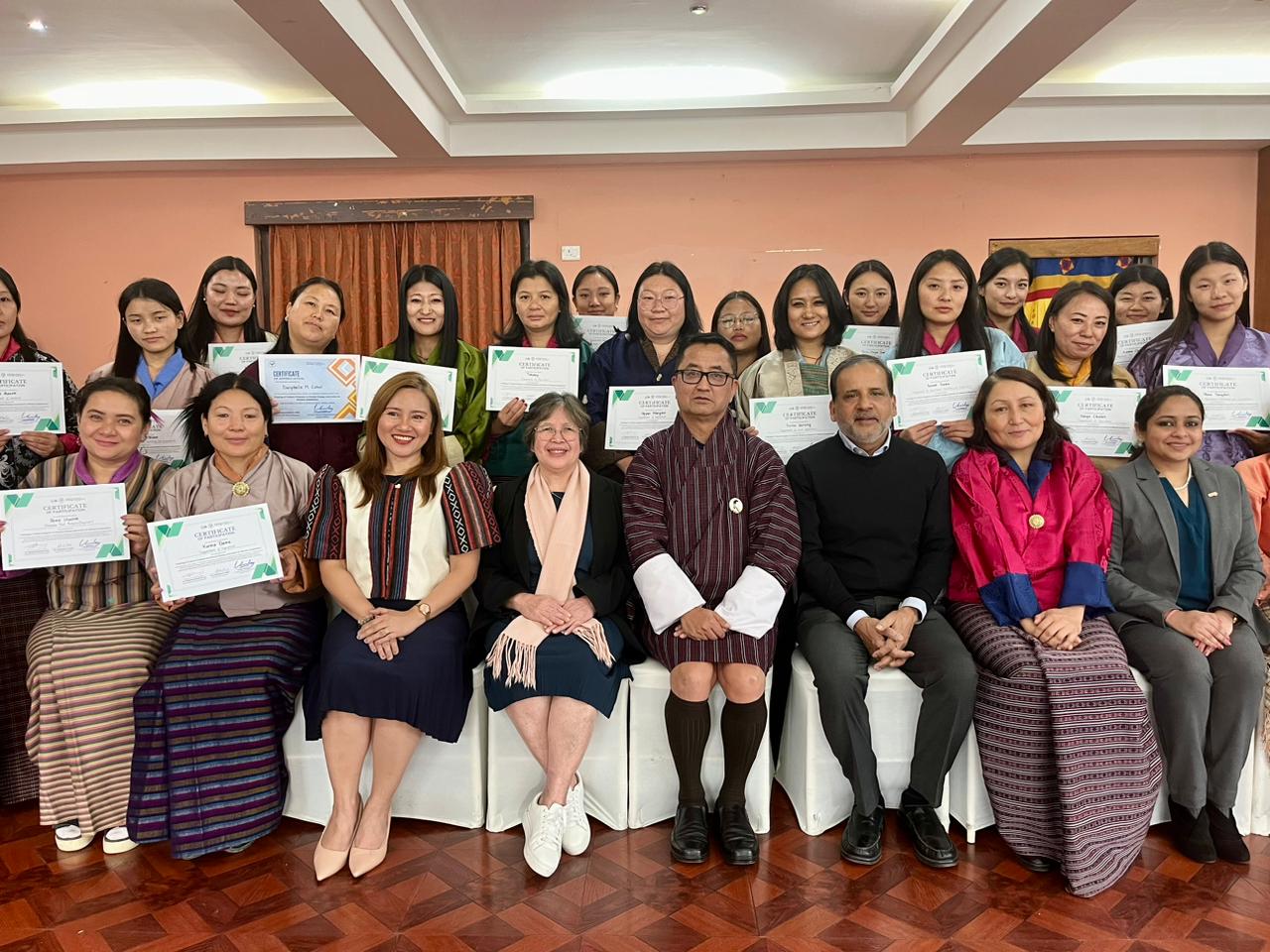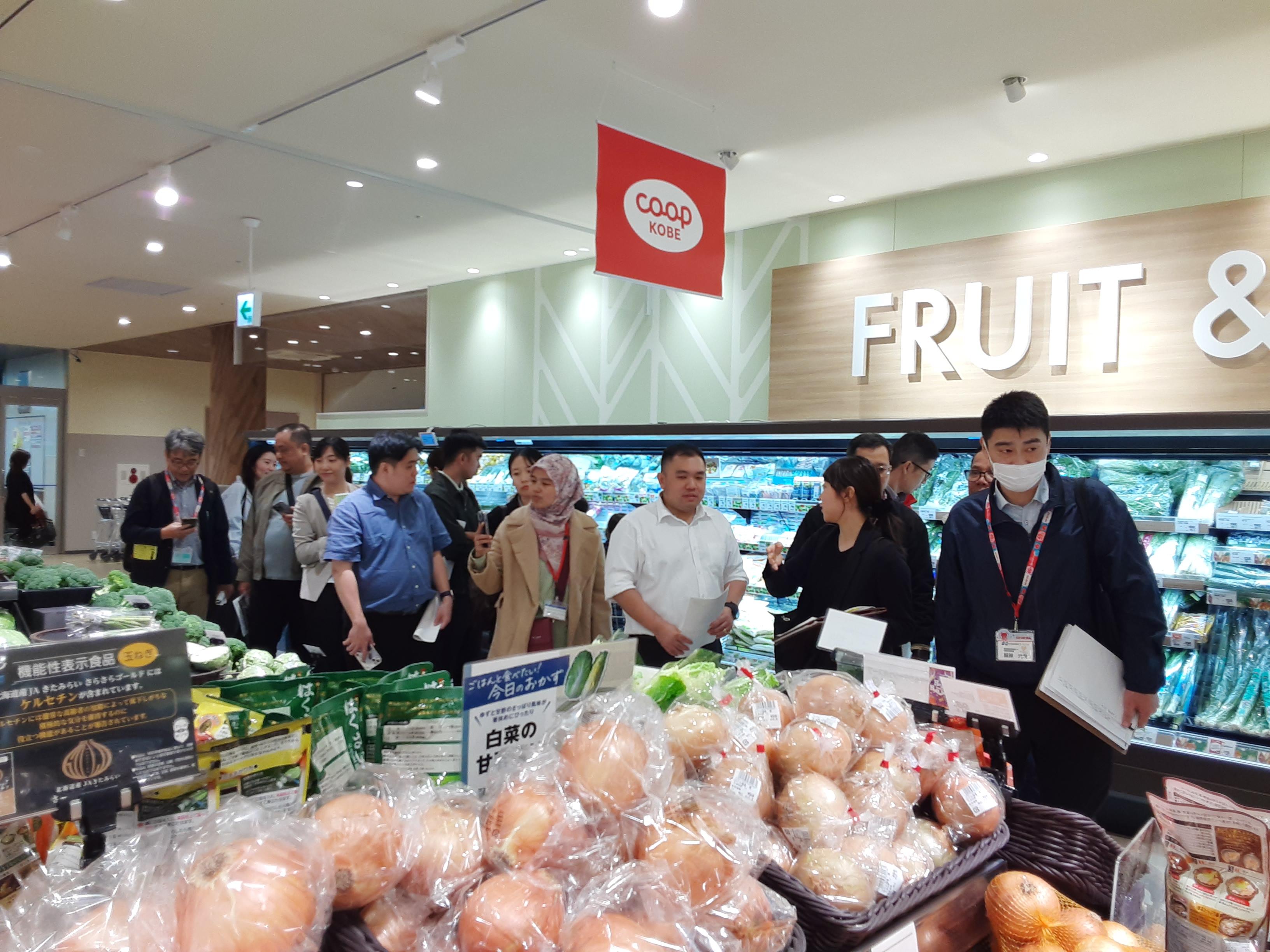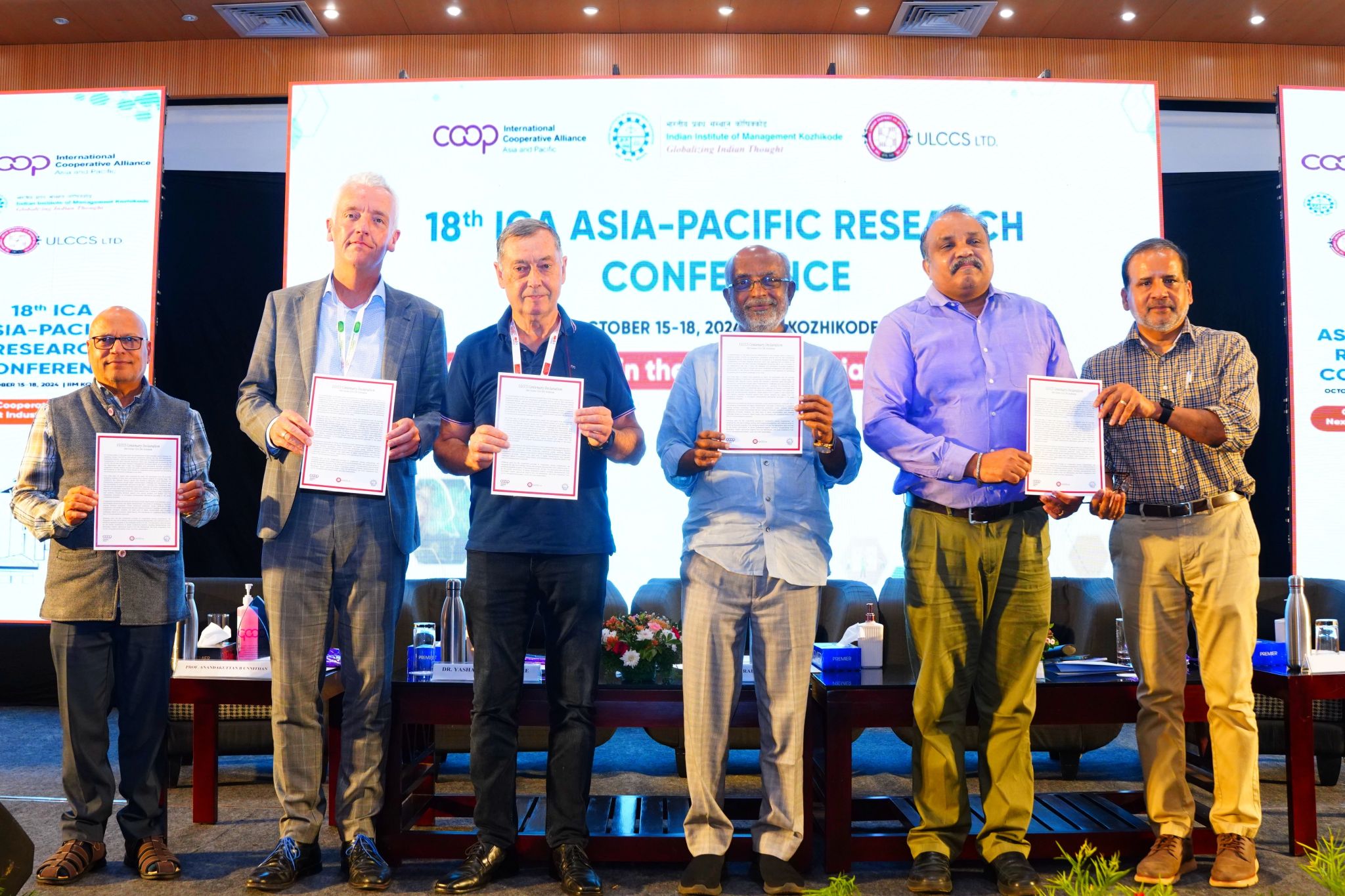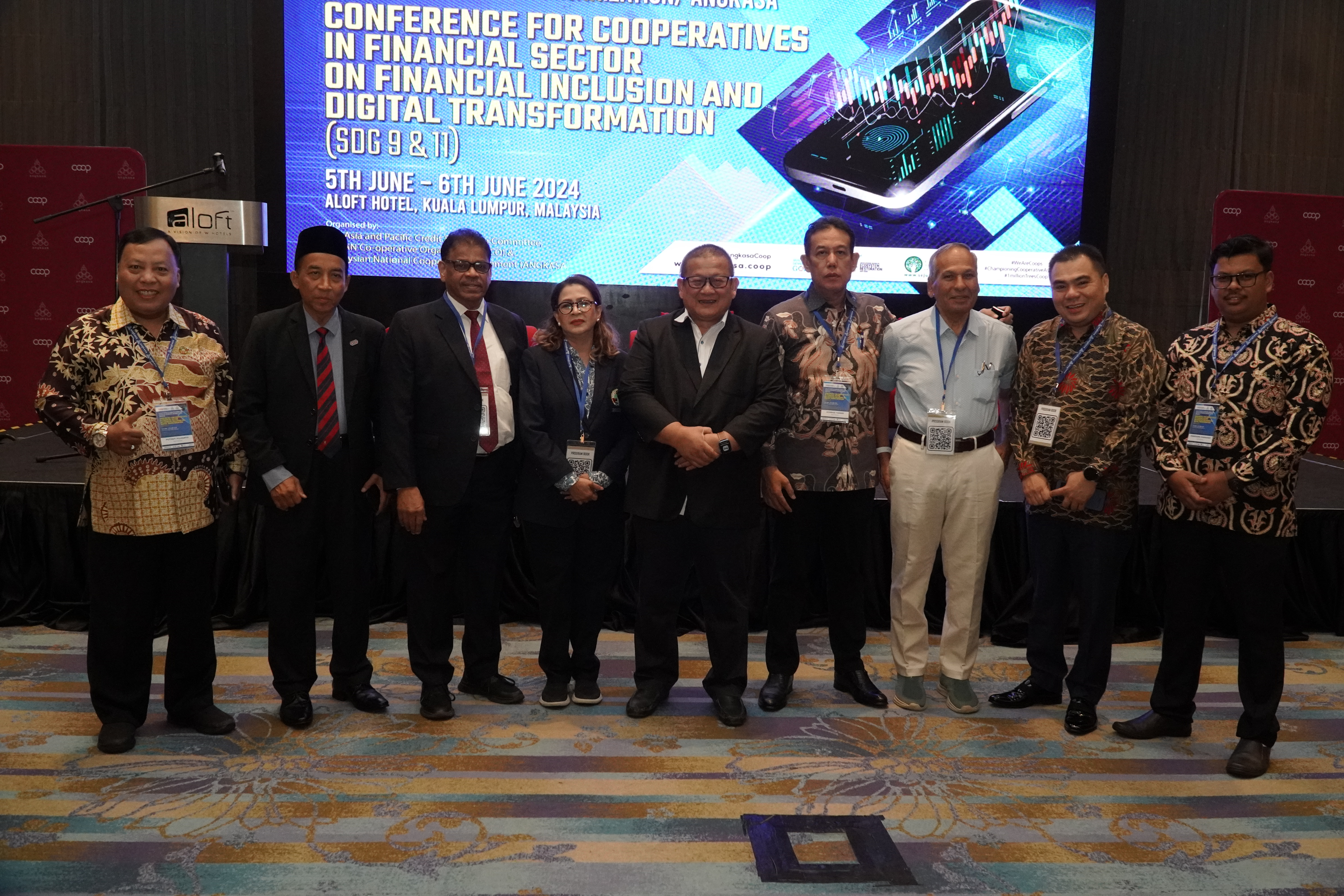ICA Director General Visits Members in Korea, China, and Japan
From 24 to 31 August, the ICA Director General Mr. Jeroen Douglas, accompanied by ICA-AP Regional Director Mr. Balasubramanian Iyer, undertook a significant visit to members in Korea, Japan, and China. The visit provided an opportunity to engage with key stakeholders, understand their contributions and challenges, and strengthen regional collaborations.
In Korea, discussions with Mr. Ho-dong Kang, Chairman of the National Agricultural Cooperative Federation (NACF), and Mr. Noh Dong-Jin, Chairman of the Korea National Federation of Fisheries Cooperatives (KNFFC), highlighted pressing issues such as an ageing farming population, rural depopulation, and competition in agriculture. The visits to Hanaro Mart, iCOOP stores, and GIMPO Local Foods Store showcased the work of Korean cooperatives in promoting local, sustainable products. The iCOOP Center in Mangpo 1-dong was exemplary in showcasing its innovative initiatives in preventive healthcare, carbon healing agriculture, and ethical consumption.
In Japan, the visit focused on the country’s leadership in the cooperative movement, particularly through organizations like JA-Zenchu, the Japanese Consumer Cooperatives’ Union (JCCU), and the Japan Cooperative Alliance (JCA). A key highlight was the discussion on Japan’s preparations for the International Year of Cooperatives (IYC) 2025. The inaugural meeting of the national steering committee for IYC 2025 in Tokyo underscored Japan’s commitment to cooperative values and SDGs. The engagements with the Ministry of Agriculture, Forestry, and Fisheries (MAFF) and the Ministry of Health, Labor, and Welfare further emphasized the government’s support for cooperative development.
The final leg of the visit to China focused on the scale and impact of the All China Federation of Supply and Marketing Cooperatives (ACFSMC). With a vast network of 800,000 outlets and 24,000 business activities generating an annual turnover of 6.7 trillion yuan, ACFSMC plays a crucial role in bridging small farmers with urban markets. Discussions with Vice President Mr. Adili Wubili highlighted ACFSMC’s goal of increasing sales by 50% over the next decade. A visit to Beijing’s Xinfadi Wholesale Market, which supplies 90% of the city’s food needs, showcased the immense scale and efficiency of China’s cooperative sector.
This visit reinforced the importance of cooperative resilience, innovation, and cross-border collaboration in addressing shared challenges and advancing the cooperative movement across the Asia-Pacific region.
ICA Global Cooperative Conference, General Assembly, and Launch of IYC 2025
The ICA Global Cooperative Conference (GCC) and General Assembly (GA) 2024 were successfully held in New Delhi, India, from 25 – 30 November 2024. Hosted by the IFFCO in close collaboration with the Indian cooperative movement, the event gathered over 3,000 delegates from 100 countries.
Launch of the International Year of Cooperatives 2025
A highlight of the conference was the historic launch of the UN IYC 2025. The launch ceremony was graced by distinguished leaders, including India’s Prime Minister, H.E. Mr. Narendra Modi; Bhutan’s Prime Minister, H.E. Mr. Dasho Tshering Tobgay; and Fiji’s Deputy Prime Minister, Hon. Mr. Manoa Kamikamica, Minister of Home and Cooperation, Government of India, Mr. Amit Shah; and Mr. Shombi Sharp, UN Resident Coordinator in India.
In his address, Dr. Guarco encouraged cooperators worldwide to embrace younger generations and continue fostering cooperation to ensure a dignified life for all.
Prime Minister Mr. Modi, in his keynote speech, underscored the vital role cooperatives play in India’s socio-economic fabric. He noted that India hosts 800,000 cooperatives, including IFFCO, the world’s largest cooperative by turnover on GDP per capita. Highlighting India’s cooperative strength, he remarked: « For the whole world, cooperatives are a business model, but for India, cooperatives are a way of life; cooperation is the basis of our culture. » Emphasizing the partnership between the Government of India and cooperatives as key to sustainable growth, Mr. Modi called for a global financial institution to support cooperatives worldwide. He thanked the United Nations for declaring 2025 as the International Year of Cooperatives and concluded: "In this IYC, we will move forward with this cooperative spirit, we will be empowered and prosperous."
Mr. Shombi Sharp praised India as "a nation synonymous with cooperation" and lauded the Government of India for establishing the Ministry of Cooperation. Prime Minister Tobgay highlighted Bhutan’s alignment with cooperative values, while Mr. Kamikamica expressed Fiji’s commitment to learning from global cooperative experiences.
In a video message, UN Secretary-General Mr. António Guterres acknowledged the indispensable role of cooperatives in addressing global challenges and advancing the SDGs. He stressed that cooperatives embody the spirit of collective action essential to building a better world.
IYC 2025, with the theme « Cooperatives build a better world », is an opportunity for the global cooperative movement to share and celebrate their stories of impact and achievements and plan for a future that builds prosperity for all. The ICA is working to increase the visibility of cooperatives and raise public awareness about their contributions to sustainable development; advocate for enabling environment and supportive legal and policy frameworks for strengthening their entrepreneurial ecosystem; and promote the growth and development of cooperatives through capacity-building initiatives, knowledge-sharing, and collaborative partnerships.
Get Involved in IYC 2025
To celebrate IYC 2025, the UN General Assembly encourages Member States, the United Nations, and stakeholders to promote cooperatives’ contributions to social and economic development. Countries and cooperatives are invited to establish national committees to coordinate IYC 2025 activities.
For guidance on:
- Creating National Committees – Refer to the official guidelines.
- Using the IYC2025 logo – Follow the UN’s specified guidelines.
Visit https://2025.coop/ for global IYC 2025 updates and events. Stay connected on social media via #IYC2025, #CoopsYear, and #cooperativesbuildabetterworld.
Global Cooperative Conference: Key Discussions
Under the theme « Cooperatives Build Prosperity for All », the three-day conference (25–27 November) centred on four key pillars:
- Reaffirming the Cooperative Identity
- Enabling Supportive Policies
- Developing Strong Leadership
- Building a Sustainable Future
With over 100 speakers participating in four plenaries and 16 parallel sessions, discussions addressed critical issues facing cooperatives globally. These insights culminated in the New Delhi Action Agenda, urging cooperatives, governments, civil society, and the private sector to take concrete steps toward a just society and a safer planet.
General Assembly and Cultural Experience
The ICA General Assembly convened cooperative leaders and members for impactful deliberations. Key highlights included the confirmation of mandates for at-large directors and the announcement of new Directors, alongside comprehensive updates from the ICA President and Director General. Delegates approved the Work Plan 2025 with a special focus on the IYC and reviewed the Strategic Plan 2026-2030. Crucial reports were presented, including those from the Working Group on voting rights and membership fees, along with proposed amendments to the Internal Rules of the General Assembly. The Cooperative Identity Consultation and its accompanying recommendations generated substantial discussion, highlighting the Assembly’s pivotal role in shaping the future direction of the cooperative movement. The international delegates visited historic and cultural tourism sites, including the Taj Mahal in Agra and cities like Ahmedabad, Jaipur, and Varanasi.
Rochdale Pioneers Award 2024
A significant moment during the event was the presentation of the prestigious Rochdale Pioneers Award 2024 to Dr. Udai Shanker Awasthi, Managing Director of IFFCO. A chemical engineer who joined IFFCO in 1976, Dr. Awasthi has been instrumental in driving the cooperative’s remarkable growth — increasing production capacity by 292% and net worth by 688%. Under his leadership, IFFCO has become India’s largest fertiliser producer and the world’s largest cooperative by turnover relative to GDP per capita.
Upon receiving the award, Dr. Awasthi remarked, « I am deeply humbled and honoured to receive this prestigious award. This recognition belongs not just to me but to the entire IFFCO family, whose dedication and hard work have driven the cooperative’s success. »
Established in 2000, the Rochdale Pioneers Award recognizes individuals or, in special cases, cooperative organizations that embody the innovative and sustainable spirit of the Rochdale Pioneers, contributing significantly to the betterment of their members.
Regional Participation at ICA GCC
The ICA Asia-Pacific Regional Office actively contributed to the ICA GCC through two dedicated parallel sessions and its participation in the Cooperative Haat (trade fair), promoting cooperation, education, and trade among cooperatives.
Parallel Sessions
The office organized two sessions focusing on ‘Cross-Regional Cooperation’ and ‘Cooperatives in Educational Institutions.’
The session on « Cross-Regional Cooperation to Build Prosperity for All » brought together all four ICA Regional Directors, moderated by Ms. Cecile Berranger from the Food and Agriculture Organization of the UN (FAO). Dr. Sifa Chiyoge (Africa) highlighted Africa’s potential to address global food security despite systemic challenges like outdated farming systems and financial constraints. Mr. Balasubramanian Iyer (Asia-Pacific) emphasized the region’s agricultural strength, citing key cooperatives such as AMUL (India), Nong-hyup (South Korea), and Zen-noh (Japan). He stressed collaboration, innovation, and robust governance as key opportunities. Ms. Agnes Mathis (Europe) shared how European cooperatives are shifting from international to transnational models, leveraging EU policies to enhance trade. Mr. Danilo Salerno (Americas) discussed post-pandemic recovery and highlighted successful cooperatives driving rural transformation. The session underscored the need for enhanced cross-regional cooperation, innovative solutions, and policy advocacy to build resilience and ensure cooperative sustainability.
The second parallel session explored the role of CEIs in fostering cooperative identity and leadership among youth. The key presentations were made by Dr. C. Pitchai (Gandhigram Rural Institute (GRI), India) on a successful school cooperative model in Tamil Nadu, promoting self-reliance and democratic governance; Dato Kamarudin Ismail (the Malaysian National Co-operative Movement (ANGKASA), Malaysia) on their efforts in integrating cooperative education into universities; Mr. Patxi Olabarria (Basque Cooperative High Council, Spain) on Spain’s model combining cooperative education with real-world applications and Mr. Junki Ito (Student Committee of the National Federation of University Co-operative Associations, Japan) who shared insights on student-run cooperatives that nurture leadership and collaborative skills. The session concluded with a consensus on scaling CEI initiatives globally, sustaining investments in cooperative education, and strengthening partnerships to cultivate future cooperative leaders.
Cooperative Haat (Trade Fair)
The Cooperative Haat showcased the rich diversity of cooperative contributions toward prosperity and sustainability. Featuring 15 organizations from various countries, the Haat provided a vibrant platform for cooperatives to network, exchange ideas, and explore trade opportunities. Key exhibitors included:
- Department of Agricultural Marketing and Cooperatives (Bhutan)
- IFFCO, AMUL, Krishak Bharti Cooperative Limited (KRIBHCO), NCUI Haat, National Cooperative Development Corporation, SEWA Federation, Haryana State Cooperative Supply and Marketing Federation Limited, Fair Trade, ESAF Cooperative, and Uralungal Labor Contract Cooperative Society Ltd. (ULCCS) from India
- Iran Chamber of Cooperatives (Iran)
- National Association of Mongolian Agricultural Cooperatives (Mongolia)
- Mondragon (Spain)
The ICA-AP Trade and Business Committee participated through a shared booth featuring members ANGKASA (Malaysia), ICC (Iran), and ULCCS (India). The booth showcased cooperative products while promoting the Committee’s mission to enhance cross-border trade and cooperation.
Through its strategic participation in conference sessions and the Cooperative Haat, the ICA regional office reinforced the importance of cooperation in education, trade, and governance to build a sustainable and prosperous future for all.
11th Asia-Pacific Cooperative Ministers Conference
The 11th Asia-Pacific Cooperative Ministers’ Conference (APCMC) took place on 28 and 29 April 2024 at the picturesque Dead Sea, Jordan, marking a significant step in fostering cooperation and dialogue to drive inclusive growth and sustainable development across the Asia-Pacific (AP) and Middle East and North Africa (MENA) regions.
Organized by the ICA-AP and hosted by the Jordan Co-operative Corporation and the Ministry of Agriculture, Jordan, the conference brought together high-level government officials from 17 countries, over 300 cooperative leaders, and representatives from international organizations such as the ILO, FAO, and the African-Asian Rural Development Organization.
The conference agenda focused on:
- The state of cooperatives in the Asia Pacific
- Enhancing government-cooperative partnerships
- Leveraging digitalization for inclusive growth, and
- Promoting gender equality within the cooperative sector.
Featuring interactive panel discussions and statements from government officials, the conference provided participants with ample opportunities to exchange insights, explore synergies, and co-create actionable solutions. The thematic sessions and statements from government officials of Fiji, the Philippines, Nepal, Lebanon, Saudi Arabia, India, Egypt, Iran, Palestine, Morocco, Malaysia, Syria, Kuwait, Libya, Thailand, and Japan touched upon crucial issues like cooperative identity, cooperatives’ role in sustainable development, enhancing food security, facilitation of easy credit for communities, affordable healthcare, digitalization, opportunities for youth and women, contribution to national economies, Voluntary National Reviews, among others.
A key highlight was the presentation of a study on government support for cooperatives, led by Dr. Yashvantha Dongre, Chairperson of the ICA-AP Research Committee. Conducted across eight countries – India, Japan, Jordan, Kyrgyzstan, Malaysia, Nepal, Korea, and the Philippines – the study assessed cooperative-government partnerships. The findings called for improved collaboration mechanisms, stronger legislative frameworks, and global sharing of best practices to advance cooperatives’ role in achieving the SDGs.
The Jordan Declaration
The conference concluded with the adoption of the Jordan Declaration, which emphasized the pivotal role of cooperatives in fostering economic growth, job creation, poverty alleviation, social inclusivity, and environmental sustainability across the Asia-Pacific region. Emphasizing the empowerment of individuals and marginalized communities, the declaration highlighted the need for collaborative efforts between governments and integrated cooperatives, the promotion of cooperative-friendly policies, and alignment with the SDGs 2030 agenda. It advocated for the preservation and promotion of the unique identity and business model of cooperatives, as well as enhancing cooperation among governments, cooperatives, and stakeholders to bolster the resilience of cooperatives in the region. The declaration was supported by all Asia-Pacific cooperative ministers present in person.
The 11th APCMC marked a historic milestone as the first-ever edition hosted in the Middle East, reinforcing the vital role of cooperatives in building resilient economies and inclusive societies. The ICA-AP is grateful to the Ministry of Agriculture, Jordan, and the Jordan Cooperative Corporation for their invaluable support in making this landmark event a success.
To cite this part
ICA-AP, « Milestones and Key Highlights », in ICA-AP Annual Activity Report 2024, New Delhi, 2024, online
